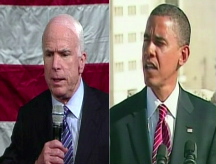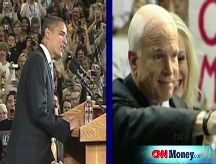Tough transition for new president
President-elect will have to assemble economic team quickly to tackle weakening economy and bank bailout on Jan. 20
NEW YORK (CNNMoney.com) -- The next United States president won't have long to savor victory after Election Day.
Facing the worst economic storm since Franklin Delano Roosevelt won the 1932 election, this president-elect will have to quickly announce his key staffers and policy priorities to reassure both the nation and the world.
"The incoming president will be facing many bigger challenges than any president since Roosevelt," said John Kamensky, senior researcher at the IBM Center for The Business of Government, which focuses on public management. "The president will have to have a very organized transition to be able to address it."
Spokesmen for Senator Barack Obama's and Senator John McCain's campaigns declined to comment on the transition, which lasts 77 days. It is widely reported that former Clinton Chief of Staff John Podesta is working with Obama, while former Reagan Navy Secretary John Lehman Jr. is guiding McCain's team.
Presidential transitions are often tumultuous, but this incoming president is facing a host of pressing matters, not the least of which is the global financial crisis. Don't forget, he also must be prepared to address the wars in Iraq and Afghanistan, as well as national security, on Day One of his administration on Jan. 20.
Lining up the cabinet. Traditionally, the president-elect first assembles his key White House appointees, particularly the chief of staff, budget and personnel directors and counsel. The secretaries of State, Treasury and Defense, along with the attorney general, are next in line. The rest of the cabinet is usually in place by Christmas.
This year, however, the Treasury secretary pick is more important than ever. Henry Paulson, the current office holder, is leading the largest federal intervention into the financial sector since the Great Depression. His successor will inherit the effort, which is less than six weeks old and still very much under construction.
Also on the schedule is a global economic summit on Nov. 15 in Washington, D.C. World leaders will look to the incoming president and his economic team -- including the White House Council of Economic Advisers and the National Economic Council -- for guidance on his policy initiatives.
So will the American public, who are waiting to see how the next president addresses critical issues such as the tidal wave of foreclosures and the bailout of the financial system.
Some 71% of people surveyed in a recent USA Today/Gallup poll feel the next president faces more serious or much more serious challenges than any new president in the past 50 years. More than two-thirds feel that stabilizing the economy should be the next president's top priority, compared to 12% who say managing the wars overseas comes first, the poll found.
Experts agree.
"I would expect the Treasury secretary and other economic appointees to be the first priority," said John Burke, professor of political science at the University of Vermont. "The sooner they can announce the key appointments, the better."
Handling the transition. Both campaigns are already working on transition plans. This is the first time nominees can submit names for national security clearance before Election Day. Each camp has already given up to 100 names to the FBI, Kamensky said.
Paulson is briefing the candidates, and the White House has already started working on its transition plans to smooth the way for the next president, experts said.
Past presidents have moved swiftly during their transition periods. Ronald Reagan, for instance, named James Baker his chief of staff shortly after Election Day. Bill Clinton held an economic summit in Little Rock, Ark., and George W. Bush's White House staff met daily before taking office.
Still, the incoming commander-in-chief must remember that he is not yet in office, experts said. While he can name his appointees and discuss his priorities, he can't actually act.
"What can you really do as a president-elect?" asked Martha Joynt Kumar, director of the White House Transition Project, a research group made up of scholars and policy institutions. "It's a really fine line you have to walk because you have to do something but you aren't president." ![]()



